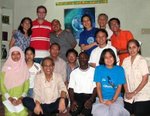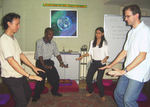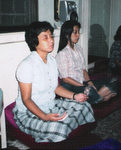Dear Everyone,
Hear ye! Hear ye!
If you were given the choice whether to go blind or to be deaf, which would you prefer? Would you rather see without hearing or hear without seeing?
This was one of the questions posed at the Tuesday Inner Work Circle last Feb.20 as we reflected on the sense of Hearing.
The most prominent point raised was the significance of sound as one of the two important elements of the universe-- together with light. Light and sound are two major forms of energy. Both manifest as waves but are perceived separately by two different human senses. This leads us to reflect on the relationship of the two. We have discussed about the sense of sight last week and this time we pondered on the sense of hearing.
The Hindu faith tradition believes that sound was first produced during the creation of the universe and this sound was “OM”. This is why central to the religious practice of the Hindus is the chanting of “OM” which is then referred to as the sound of God or a mantra that connects us to the source of creation. This also makes sense why scientists now refer to the creation of the universe as “The Big Bang.”
Indeed, even from the Bible it is interesting to note how the sound was given importance. “In the beginning was darkness” (the absence of light), then God said “Let there be light!” and then there was light. Notice that although it seemed that light was created first, God used sound or words in order to command the creation. Also found in the Bible was the statement: “In the beginning was the word, and the word was made flesh.”
A Muslim brother agrees to this point as he shared quotes from the Qur’an about how “sound is as old as creation” and how it has for the longest time been divine medium. He pointed out that mankind never has been allowed to see God, but prophets, sages and masters have always heard instructions and messages from God. Someone said “inner locution” was how the Catholics call it.
When we are born the first thing we do after inhaling the first breath is to cry, to make a sound. Only after days later can the baby open its eyes. Come to think of it, months even before he/she is born the baby can already hear and can be affected by the sound or music that the pregnant mother hears! (This has been scientifically studied—although it has already been mentioned in the ancient Vedic scriptures.)
I’ve heard somewhere that when a person dies, the last sense that fades away is the hearing. I guess this is also why in some, if not most, traditions relatives still talk, sing or chant to their beloveds who just died (knowing that the person would still hear them).
It’s always interesting to gain rich insights after discussing about simple things that we take for granted such as seeing and hearing. We’ve established through the discussions that although there exists the physical perception (image or sound), there is also what can be considered as “inner sense” (inner vision or inner hearing). Personally I have fondly gained the insight that for these “inner” perceptions we no longer use the physical sensory organs but a different set of “inner” sensory organs. Call it “spiritual organs” or non-physical organs.
It would seem that just as we see with the physical eyes, we “spiritually see” with the non-physical mind-- hence, the words “insight”, “hindsight,” or “foresight.” Even the concept of the “third eye” gives reference to the mind and its extrasensory powers.
On the other hand, to hear with the physical ears corresponds to “spiritually hearing” with the non-physical heart (not to be confused with the physical organ that pumps blood throughout our arteries). This gives reference to such concepts as “heart listening” or even the concept of listening itself as opposed to hearing. When we really listen to a person we not only hear him/her with out ears but we also use our heart to “hear the person’s feelings.”
At Inner Work we are often told to “listen not only to the words but also to the silence of the other.” I do believe that pertains not only to just “lending an ear” but to “opening a heart” as well.
How about we HEAR from you?
skip to main |
skip to sidebar








updates/reflections/reports on The Peacemakers' Circle INNER WORK - Self Awareness Program

Go to

About the Tuesday Inner Work Circle
The Peacemakers' TIWC is a support group/sharing circle where ordinary people from different faith backgrounds share with one another insights, reflections, personal experiences and life challenges within the backdrop of their respective spiritual traditions as they strive to become true instruments of peace by practicing heart-listening and cultivating self-awareness and individual transformation.
About Me

- The Peacemakers' Circle Foundation, Inc. (TPCFI)
- The Peacemakers' Circle is a non-stock, not-for-profit, and non-partisan organization composed of people of diverse religions, spiritual expressions, and indigenous traditions who recognize the Oneness of Humanity and are guided by the Principles of Unity in Diversity, Good Will, and Cooperation. Thinking globally and acting locally, we strive to bring forth the highest ideals and teachings of our faith as we work together to promote spiritual self-awareness and “be the change that we wish to see in the world!”

Blog Archive
-
▼
2007
(26)
-
▼
June
(19)
- Your concept/image of God & You (June 19, 2007)
- Becoming out of God (June 12, 2007)
- God Concepts (An ex-atheist’s sharing - June 05, 2...
- More on Inner Peace (May 29, 2007)
- Inner Peace (May 22, 2007)
- The power of the Unspoken word (May 15, 2007))
- Celebrating the universal teachings of the Buddha ...
- Encounter with a Guru (Open Evening fieldtrip - Ap...
- Preparing humanity for a great transition (Apr. 17...
- Easter reflections (Apr. 10, 2007)
- Sharing Malaysia, Indonesia, India (Mar. 03, 2007)
- Spreading white Light (Open Evening with Byakko Sh...
- Care to lend an ear? (Feb. 02, 2007)
- Making Sense: Seeing (Feb. 13, 2007)
- My Physical Self (Feb. 06, 2007)
- Temple visit Hare Krishna (Jan. 30, 2007)
- Fears & Concerns in Life (Jan. 23, 2007)
- Introducing new Inner Work Self-Reflection (Jan. 1...
- Renewals & New Beginnings (Jan. 09, 2007)
-
▼
June
(19)
The TIWC Gang 2006

JOIN US
EVERY TUESDAY 6:00-8:00PM at The Peacemakers’ Circle (Unit 105 PhilDHRRA Partnership Center, 59 Salvador St., Varsity Hills, Loyola Heights, QC. – 2 blocks from McDonald’s/Shakey’s parallel Katipunan Ave. across Ateneo gate 2). Let us know if your dropping by – tel. 920-7622 or 0918-7822805 (OrlanD) ; peacemakerscircle_uri@yahoo.com


TIWC 2007

Visit the URI blogsite
Know more about the UNITED RELIGIONS INITIATIVE --
www.uriseapacific.org
www.uriseapacific.blogspot.com
www.uriseapacific.org
www.uriseapacific.blogspot.com
No comments:
Post a Comment